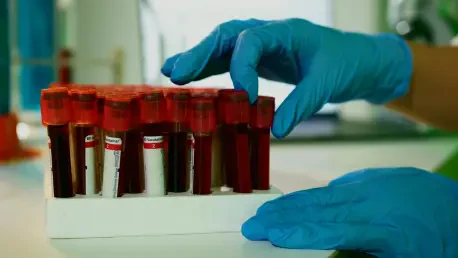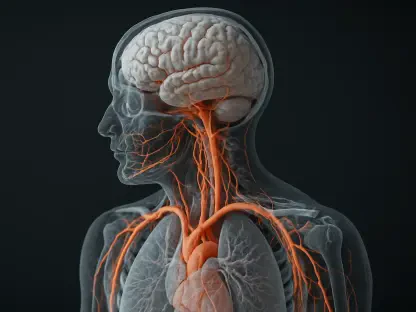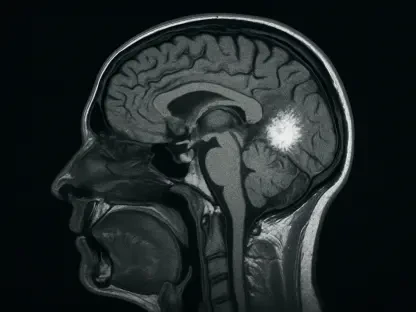In a remarkable leap forward for brain health diagnostics, C2N Diagnostics, a trailblazing company based in St. Louis, Missouri, has taken a historic step by submitting an innovative blood test for Alzheimer’s disease to the U.S. Food and Drug Administration (FDA) for review. This development could potentially redefine how the disease is detected, shifting from invasive and costly methods to a simpler, more accessible blood-based approach. With millions of people worldwide affected by Alzheimer’s, the urgency for effective diagnostic tools has never been greater. This submission not only highlights technological advancement but also addresses a critical gap in early detection and patient care, offering hope to countless families grappling with the challenges of cognitive decline. The promise of a non-invasive test could transform clinical practice, making diagnosis a less daunting process for both patients and healthcare providers, while paving the way for earlier interventions that might slow disease progression.
Technological Innovation in Alzheimer’s Diagnostics
Revolutionizing Diagnosis with HRMS
The introduction of high-resolution mass spectrometry (HRMS) in C2N Diagnostics’ latest blood test submission marks a significant departure from traditional diagnostic methods for Alzheimer’s disease. Unlike cerebrospinal fluid (CSF) analysis or amyloid PET scans, which are often invasive, expensive, and limited in availability, this blood-based test offers a far more accessible alternative. HRMS enables the detection of subtle changes in plasma biomarkers with exceptional precision, providing a window into brain pathology without the need for complex procedures. This technology could democratize Alzheimer’s diagnostics, allowing more patients, especially those in underserved areas, to receive timely evaluations. The potential to integrate such a test into routine medical checkups could fundamentally change how early signs of cognitive impairment are identified and managed, reducing the burden on specialized facilities.
Moreover, the shift to HRMS-based testing reflects a broader trend in medical diagnostics toward non-invasive solutions that prioritize patient comfort and scalability. For adults aged 50 and older experiencing mild cognitive impairment or dementia, this test could serve as a critical tool for healthcare providers to make informed decisions. The ability to detect Alzheimer’s pathology through a simple blood draw eliminates many barriers associated with current methods, such as the need for specialized equipment or trained personnel. By focusing on accessibility, C2N’s approach not only addresses logistical challenges but also aligns with the growing demand for equitable healthcare solutions. If approved by the FDA, this test could set a new standard for diagnosing neurodegenerative conditions, encouraging further innovation in the field of brain health diagnostics.
Algorithmic Precision and Biomarker Analysis
At the heart of C2N’s blood test lies a sophisticated proprietary algorithm that integrates multiple plasma biomarkers to assess Alzheimer’s risk. Key indicators such as β-amyloid ratios (Aβ42/40) and tau peptide isoforms (p-tau217/np-tau217) are analyzed and combined into a single score ranging from 0 to 100, reflecting the likelihood of brain amyloid pathology—a hallmark of the disease. This data-driven approach ensures a high level of accuracy, distinguishing it from less precise diagnostic tools. The use of such detailed biomarker analysis underscores the potential of precision medicine, where individual profiles guide clinical decisions. This method not only enhances diagnostic reliability but also provides actionable insights for tailoring patient care plans based on specific biological markers.
The reliance on algorithmic scoring further elevates the test’s clinical value by offering a standardized way to interpret complex data. By translating intricate biomarker measurements into a comprehensible score, the test empowers healthcare professionals to communicate findings effectively to patients and their families. This clarity is crucial in a field where uncertainty often compounds the emotional toll of a potential Alzheimer’s diagnosis. Additionally, the integration of HRMS ensures that even minute variations in biomarker levels are captured, setting a benchmark for sensitivity in blood-based diagnostics. As the medical community increasingly embraces technology-driven solutions, this algorithmic approach could inspire similar advancements across other neurodegenerative diseases, broadening the impact of C2N’s innovation beyond Alzheimer’s alone.
Clinical Impact and Industry Recognition
Building on Proven Success
C2N Diagnostics has already established a strong foundation in brain health diagnostics with its Precivity™ line, including the PrecivityAD® and PrecivityAD2™ tests, which have demonstrated over 90% accuracy in clinical studies. Published in respected journals like the Journal of the American Medical Association, these studies validated the tests against traditional diagnostics such as CSF analysis and PET scans, confirming their reliability in diverse settings, from primary care to specialized memory care. The latest FDA submission builds on this legacy, aiming to expand the reach and impact of blood-based testing. This track record of success lends credibility to the new test, positioning C2N as a leader in non-invasive Alzheimer’s diagnostics and reinforcing trust among healthcare providers who rely on accurate tools to guide patient management.
The significance of this progression cannot be overstated, especially in primary care environments where most patients first report cognitive concerns. Unlike specialized clinics, primary care settings often lack access to advanced diagnostic equipment, making a blood test an ideal solution for early detection. Endorsements from experts further highlight the test’s potential to bridge this gap, with clinical validation providing a robust evidence base for its adoption. The focus on real-world applicability ensures that the test addresses practical challenges faced by general practitioners, enabling them to play a more active role in Alzheimer’s care. As the healthcare landscape evolves, such innovations could shift the burden of diagnosis away from overstretched specialists, fostering a more integrated approach to managing cognitive health across different levels of medical practice.
Shaping the Future of Alzheimer’s Care
The submission of C2N’s blood test to the FDA aligns seamlessly with the growing emphasis on blood-based biomarkers in neurodegenerative disease diagnostics, reflecting a critical need for scalable solutions. As the global burden of Alzheimer’s continues to rise, tools like this one promise to streamline early detection and intervention, which are vital for improving patient outcomes. Experts such as Dr. Howard Fillit from the Alzheimer’s Drug Discovery Foundation have lauded the accuracy and actionable nature of such tests, emphasizing their role in ruling Alzheimer’s in or out during initial assessments. This capability could significantly reduce diagnostic delays, ensuring that patients receive appropriate care sooner and potentially benefiting from emerging therapies that target early-stage disease progression.
Beyond immediate clinical applications, the broader implications of this development extend to research and drug development. With over 150 research studies worldwide under its belt, C2N has collaborated with major pharmaceutical companies, academic institutions, and advocacy organizations like the Alzheimer’s Association, amplifying the test’s relevance in advancing scientific understanding. The FDA’s earlier recognition of C2N’s technology as a Breakthrough Device further signals its potential to address unmet needs, accelerating the path to approval. If successful, this test could catalyze the creation of personalized treatment plans and support the development of disease-modifying therapies, reinforcing the promise of precision medicine. As the Alzheimer’s community looks ahead, the impact of this milestone submission continues to resonate, offering a glimpse into a future where diagnostics and care are more accessible, accurate, and tailored to individual needs.









